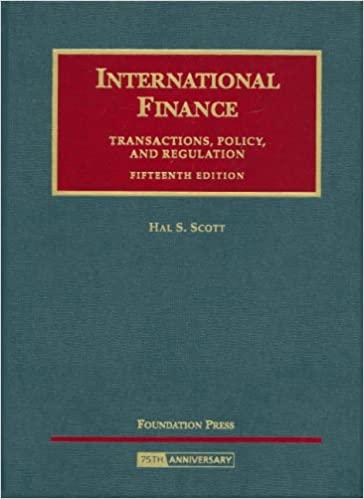Question
Quantitative Problem 1: A warrant is a long-term option from a company that gives the holder the right to buy a stated number of shares
Quantitative Problem 1: A warrant is a long-term option from a company that gives the holder the right to buy a stated number of shares of the firms stock at a specified price for a specified length of time. Generally, warrants are distributed with debt, and they are used to induce investors to buy long-term debt that carries a lower coupon rate than would otherwise be required. The exercise of warrants brings in additional funds to the firm.
A corporation decides to issue 10-year bonds to fund a necessary expansion. If they were straight bonds, they would carry a 7% annual coupon. However, the bonds with warrants can be sold with a 5% coupon. Thus, investors would be paying $1,000 in return for the 5% coupon, 10-year bond and 25 warrants.
What is the price of the 5% coupon bonds? Do not round intermediate calculations. Round your answer to the nearest cent.
$
Quantitative Problem 2: A warrant is a long-term option from a company that gives the holder the right to buy a stated number of shares of the firms stock at a specified price for a specified length of time. Generally, warrants are distributed with debt, and they are used to induce investors to buy long-term debt that carries a lower coupon rate than would otherwise be required. The exercise of warrants brings in additional funds to the firm.
A corporation decides to issue 10-year bonds to fund a necessary expansion. If they were straight bonds, they would carry a 9% annual coupon. However, the bonds with warrants can be sold with an 8% coupon. Thus, investors would be paying $1,100 in return for the 8% coupon, 10-year bond and 21 warrants.
What is the total value of the warrants and the value of each warrant? Do not round intermediate calculations. Round your answers to the nearest cent.
Value of the warrants: $
Value of each warrant: $
Quantitative Problem 3: A warrant is a long-term option from a company that gives the holder the right to buy a stated number of shares of the firms stock at a specified price for a specified length of time. Generally, warrants are distributed with debt, and they are used to induce investors to buy long-term debt that carries a lower coupon rate than would otherwise be required. The exercise of warrants brings in additional funds to the firm.
A corporation decides to issue 10-year bonds to fund a necessary expansion. If they were straight bonds, they would carry a 10% annual coupon. However, the bonds with warrants can be sold with an 8% coupon. Thus, investors would be paying $1,200 in return for the 8% coupon, 10-year bond and 24 warrants.
Suppose that the warrants expire in 5 years, and the exercise price on the warrants is $10. (Remember that each bond includes 24 warrants.) The firms current stock price is $9.00, but the price is expected to grow by 13% per year. Assuming that the warrants will not be exercised prior to expiration, what is the overall rate of return to investors? Do not round intermediate calculations. Round your answer to one decimal place.
%
Please Show Work!!! Thank you
Step by Step Solution
There are 3 Steps involved in it
Step: 1

Get Instant Access to Expert-Tailored Solutions
See step-by-step solutions with expert insights and AI powered tools for academic success
Step: 2

Step: 3

Ace Your Homework with AI
Get the answers you need in no time with our AI-driven, step-by-step assistance
Get Started


